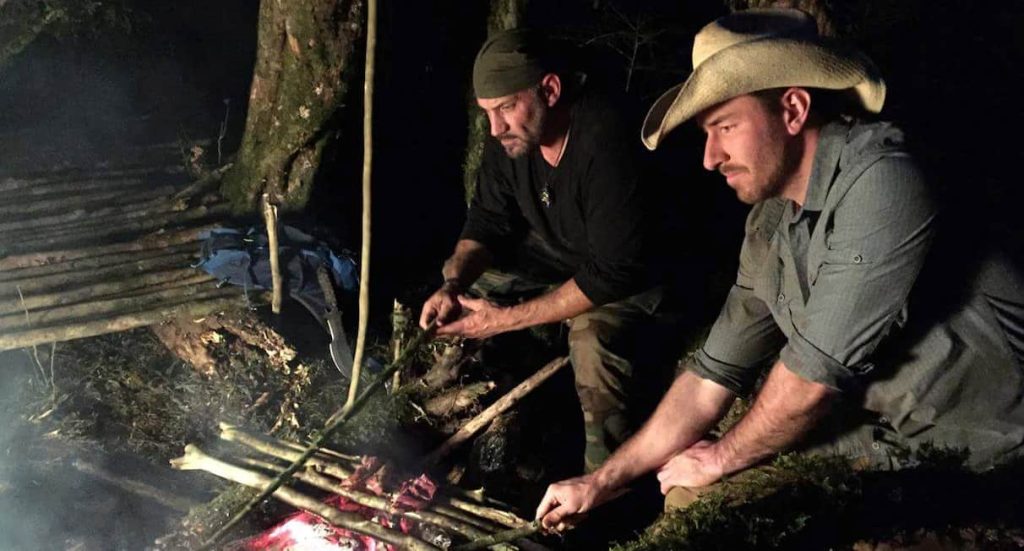The Reality of Survival Training
People always ask me about the best way to learn Survival Skills. With the flood of Survival TV Shows and high-end action movies, survival has become the new shiny object; it’s cool, mystical, and sometimes hypnotic. Because of this, a new YouTube or Tik Tok Survival Instructor is popping up daily. Survival is a LIFE-SAVING SKILL; it doesn’t lend itself well to a novice Instructor or someone who wants to be the next “Viral Thing.”
The real reality is a lot of dedicated work over years of study, practice, and learned lessons. Yes, there are books, videos, and TV shows you can learn a lot from, and they have saved some lives. BUT… there is no substitute for a personal learning experience with a Bonafede Instructor who can observe you, offer tips and coaching, show you where you need to adjust, and give you confidence when you succeed at a skill. You look up and see the instructor nodding with a smile. Sure, people get wrapped up in the costs of Instruction.
The adage … “You pay for what you get!” It will echo so loudly in an actual Survival situation should you need to rely on the skills said instructor taught you. I know times are tough, and people must look at their situation and finances. But again… we are talking LIFE-SAVING SKILLS here, folks! So do your homework on the instructor you choose.
In reality, survival training, typically associated with wilderness survival, holds a broader spectrum of benefits. It’s not merely about learning survival strategies for extreme conditions but a comprehensive approach to personal growth, resilience, and problem-solving.
The Other Side of the Coin Impacts of Survival Training:
Survival Skills: Transcending the Wilderness
Survival training is a skillset development process beyond basic survival in the wilderness. It imparts a survivalist mentality that aids in tackling a multitude of life’s challenges. The ability to stay composed and think clearly during high-pressure situations, to improvise solutions when resources are scarce, and to endure hardship are all cultivated during survival training. These skills can significantly improve your performance in various aspects of life, including your professional life and personal relationships.
Strengthening Mental Resilience and Emotional Stability
Survival training is a mental and emotional boot camp. It pushes your boundaries, tests your limitations, and helps you develop the mental toughness to remain calm and focused in high-stress situations. This emotional resilience is a powerful tool that can be harnessed daily. Whether you’re facing a personal crisis, a challenging work situation, or a stressful event, the mental fortitude built through survival training can be your stronghold.
Mastering the Art of Resourcefulness
At the heart of survival training is the development of resourcefulness. It teaches you how to make the most of what you have and how to innovate when resources are limited. This mindset is beneficial not only in wilderness scenarios but also in everyday life. For instance, you might use these skills when planning a budget, optimizing your workflow, or solving complex problems at work.
Navigation Skills: Fostering Self-Reliance
One of the practical skills you acquire through survival training is navigation. Knowing how to find your way in the wilderness can translate into greater independence and confidence in other areas of life. Whether hiking in a remote area, navigating public transport in a new city, or finding your way through a complex project at work, these skills can prove invaluable.
First Aid Skills: A Critical Asset in Everyday Life
Survival training also encompasses first aid skills, which are crucial for emergencies. Knowledge of basic first aid procedures can help you respond effectively to accidents at home, at work, or on the road. It could even help save a life.
The Broader Impact of Survival Training in Society:
Enhancing Community Resilience is huge, and when more individuals in a community are equipped with survival training, it enhances the overall resilience of that community. In natural disasters or other emergencies, community members can respond effectively and help each other, significantly improving the outcome of such events.
Encouraging Environmental Stewardship by participating in Survival training fosters a deep appreciation and respect for the environment. Trainees learn to live harmoniously with nature, minimizing their impact and promoting sustainability. This can contribute to more environmentally friendly behaviors and attitudes in daily life.
Inculcating Leadership and Teamwork Skills through Survival training often involves group activities, which foster essential teamwork and leadership skills. Working in a team to overcome survival challenges can help develop effective communication, strategic planning, and the ability to take and give directions. These skills are transferable to various settings, including the workplace, sports teams, and family interactions.
Leadership Development through Survival scenarios often requires decisive action and the ability to inspire and motivate others. As such, survival training can be a powerful catalyst for leadership development. It nurtures the ability to make quick, informed decisions, remains calm under pressure, and lead by example, all of which are key qualities of effective leadership.
Teamwork Enhancement through Survival training also emphasizes the importance of teamwork. Cooperation and coordination can distinguish between success and failure in a survival situation. Participants learn to work together, leverage each other’s strengths, and support one another in overcoming challenges. This experience can enhance interpersonal relationships and foster a collaborative spirit in various aspects of life.
The Physical and Health Benefits of Survival Training:
Survival training also has a significant impact on physical health and well-being. The physical activities involved in training—hiking, building shelters, and learning to find food—promote overall fitness, strength, and endurance. Not to mention what happens when you unplug from society for several days and put away cell phones and computers. What that will do for your body clock and spirit is amazing. It is a Body Reset! Nature heals you through and through…mind, body, and soul. It is why so many Veterans head off and Thru-Hike the Appalachian Trail, to walk off the war!
Boosting Physical Fitness as Survival Training is a full-body workout that engages various muscle groups. The physical tasks involved in survival training, such as climbing, running, and lifting, can improve cardiovascular health, build muscle strength, and enhance flexibility and balance.
Improving Nutritional Knowledge as Survival training often includes lessons on finding and preparing food in the wilderness. This can lead to a better understanding of nutrition and the importance of a balanced diet, which can form healthier eating habits in daily life.
The Unseen Benefits of Survival Training are huge and much more than just learning physical outdoor, survival, and bushcraft skills. You can now see it has an even more significant impact that benefits everyone. While primarily associated with wilderness survival, survival training has far-reaching benefits permeating every aspect of life. From boosting mental resilience and emotional stability to fostering a mindset of resourcefulness and independence, survival training is a powerful tool for personal growth.
Furthermore, the skills and values it instills contribute to stronger communities and a more sustainable world. By recognizing these unseen benefits, we can genuinely appreciate the transformative potential of survival training. I encourage you first to get outside at least and make sure you take the gear needed to stay safe and ready, but also to look into getting some Basic Survival Training, whether it’s starting with some of the videos I offer or taking one of the live training courses I offer at my website.



